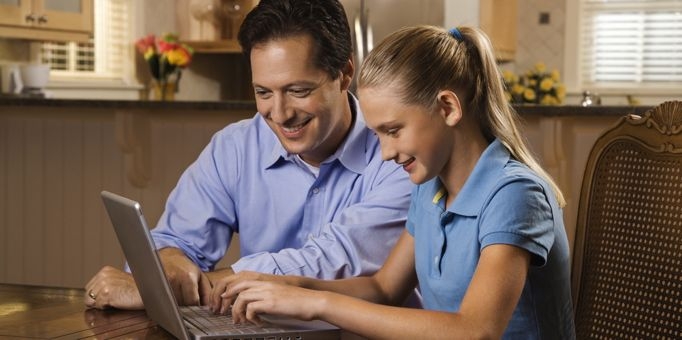
Cyber Parenting on Facebook
How do modern parents care for their kids on the world's biggest online network?
Facebook is the most popular Online Social Networking (OSN) site on the internet. It passed the billion-user mark in October 2012, just eight years after its inception. You have probably heard that if it were a country, it would be the third largest in the world, behind China and India. Like any country trying to provide infrastructure and services to its citizens, Facebook spends considerable effort understanding its population demographics, profiling its user population (largely for advertising purposes) more intimately than any government census ever could.
The parallels with countries don't end there. Like an exotic travel destination, Facebook can be like a far-off place some have heard of but never visited. For others, it is a daily destination where a great deal of life is spent. A few even find the thought of not visiting Facebook akin to being exiled. Which is why Facebook is also often compared to a drug.
Why we stay on Facebook
Psychologists already recognise social media addiction as a disorder and have developed a specific scale to classify just how bad a patient's condition is. While your friends' status updates and photos may be of interest, the real appeal that keeps people coming back is the rush they get from seeing others "like" or comment on their posts.
Recently however, an academic paper by students at Princeton University compared Facebook to an infectious disease, and predicted its death. They used epidemiological models that describe the way diseases spread and eventually abate in a population. The reasoning behind the comparison is fairly easy to see. The uptake of OSNs is dependent on whether a person's friends are using it. If your friends actively use Facebook, you're more likely to join. This is likened to infection. If your friends start to visit less frequently, there is less to hold you there, and you are more likely to leave. They consider this to be like recovery.
Is Facebook finished?
By fitting the popularity of "Facebook" as a search term to a modified disease infection and recovery model, the researchers conclude that Facebook will become unpopular (like MySpace before it), eventually losing 80% of its active users some time between 2015 and 2017. There are other reports that have already declared Facebook to be "uncool" for teens, who are said (by some) to be leaving in droves, because their parents and grandparents are on it.
There are of course many naysayers who don't accept Facebook's imminent demise, providing reasons why the epidemiological models are not an appropriate analogy. Even before this modelling, Facebook's founder Mark Zuckerberg declared that it doesn't matter whether Facebook is cool, rather his goal is for it to be a utility—essential infrastructure for modern life. We certainly have teens who use Facebook as a primary communication medium, organising much of their social lives through that utility.
Whether or not these epidemiological models accurately predict the death of Facebook is yet to be seen. If true, it would seem that as a phenomenon, Facebook has caused a great flurry in it's short existence. Just as parents were coming to grips with some of the social issues they need to understand, and a new parenting context they were operating in, it is apparently waning.
Where does that leave parents?
How should we as parents react to Facebook? As a destination, drug or disease?
The key thing to remember is that technology changes rapidly, and will continue to do so. Just when you think you have a handle on what your kids are using and influenced by, it is bound to change. As parents we cannot afford to slip into a "set and forget" mode. We need to be actively interested and engaged with our kids and how they engage with technology. That will look different at different ages.
Kids under 13 shouldn't be on Facebook anyway—it's against Facebook's Terms of Service. If you allow them to sign up with a false date of birth, what are you teaching them about the value of their word in declarations they make? You should still of course be engaged with your pre-teen's technology use. In fact you should have more direct control over what your children use the younger they are.
For parents of teens, ask yourself if you know all the apps and OSNs they use—on their smart phone, media player, tablet and the web. If you're not sure whether you're up to date on all the places they hang out online, ask them. One way to begin that conversation in a non-threatening way is to ask them about the apps their friends are using.
We've always been advocates of being their "friends" on Facebook or whatever OSN they join. For us it is a condition of them having an account. We don't want to be excluded from their online world, just as we wouldn't want to be excluded from their offline world. And just as in the "real" world, we are also careful not to embarrass them in the virtual one. By being their friends we get a glimpse into part of their world we can't otherwise physically see. That visibility can allow us to coach them and privately debrief situations that are happening online. It's a golden parenting opportunity. We also have the chance to model to them how we live out our faith and a life of integrity, having the same character online and off.
So enjoy the destination together, monitor and model moderation to avoid addiction, and be prepared to find new destinations. The only certainty is change.
About the author: James Boswell and his wife Simone have six children aged nine to 19. They are the authors of Cyber Parenting: Raising Your Kids In An Online World, and speak at conferences and churches about parenting and technology.
For more articles from Growing Faith, subscribe to our monthly e-newsletter.
To hear about the latest books and resources from Youthworks Media, subscribe here.







